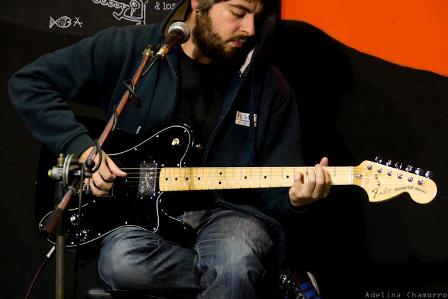(English version of an article first published on Cooltivarte.com)
It is a strange dusk. There are flowers from other springs, there is a world that spins around but a heaven that stands still, as if it no longer had a reason to exist, but which stands there for lack of a better frontier to aim for.
And it is a strange dusk simply because all which is connected with the end of feelings is strange. And you know the night will have a bosom that will expand like a century of memories, way beyond hope, deception, and each and every glimpse of mercy there could ever be. And way, way beyond that yesterday in which everybody dares to say “tomorrow”.
Such is the context of the album under review right now: “¿Sueñan los Lobos con Ovejas Lunares?” [Do Wolves Dream of Lunar Sheep?] by ¿Lobo Está?, the solo project of Gonzalo Saavedra, a musician from the City of San José who was a member of the now-defunct band Pueblo Viejo [Old Town]. The album (get it here for free) has been helmed by producer (and frequent instrumentalist) El Niño Que Toca Fuerte [The Child Who Makes A Racket], and it features Emiliano Pérez Saavedra on drums and Juan Chilndrón on bass. And Matías Gonzáles (from Vincent Vega) has a guest spot on the song “Viento” [Wind].
All of the songs included on the album come together and then come undone throughout that strange dusk. They are there at that time in which lots of things end, and many others have a chance to truly begin. Gonzalo himself says as much as “Entrego Mi Cuerpo Al Viento” [I Yield My Body To The Wind] starts playing:
Todo lo que fuimos no será nada
Comparado con lo que seremos
[All we have been will be nothing
Compared to what we will become]
When the CD begins spinning, the tone is more or less conciliatory. But the message mutates very swiftly indeed, as if all these things that have already come and gone became a clamp of angst, a hindrance to all these things the future could hold. Darkened rooms are opened, and truths are revealed. There are words which become unpronounceable, and reasons no logic could abolish.
“Entrego Mi Alma Al Viento” is surrounded by songs such as “El Túnel” [The Tunnel], “Mañana” [Tomorrrow] and “Invierno” [Winter]. In all cases, these songs partake of the insecurity that characterizes every ending, and reality is transformed in a way that creates either a pact of silence, or the longing for a vicarious exaction.
On “El Túnel”, a fear which is strafed both by ineptitude and by guilt grabs hold of the soul and refuses to ever let it go. To think about time all the time (“Mañana”) is the most untimely of duties. And doubts can vilify even the freest lives in a song such as “Invierno”, and the enumeration of a past which wasn’t that wearisome to begin with ends up sounding like a joke that nobody has even told Continue reading


